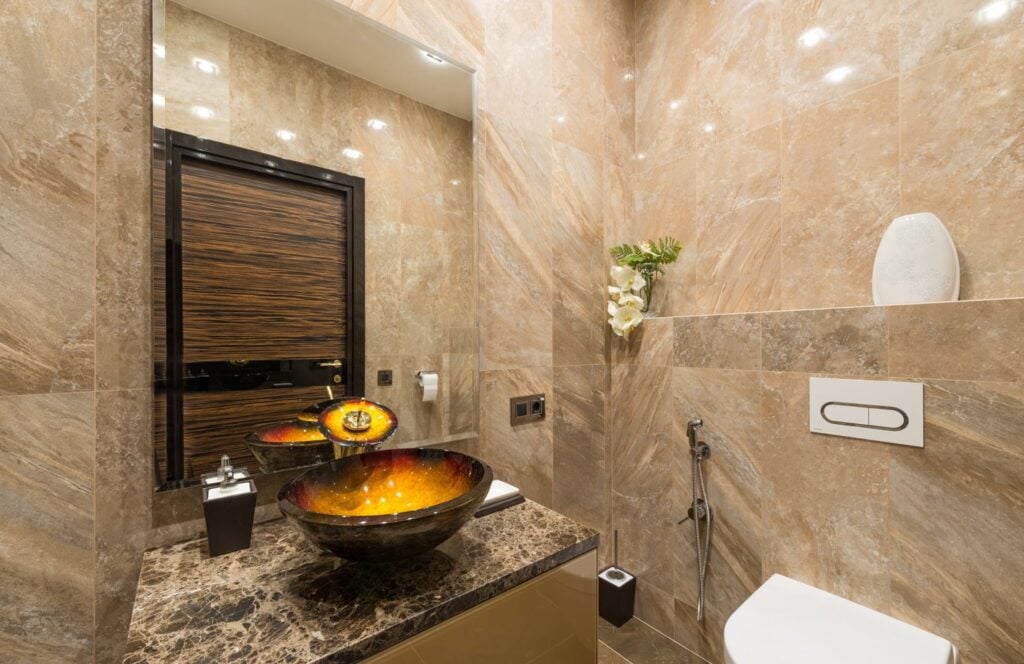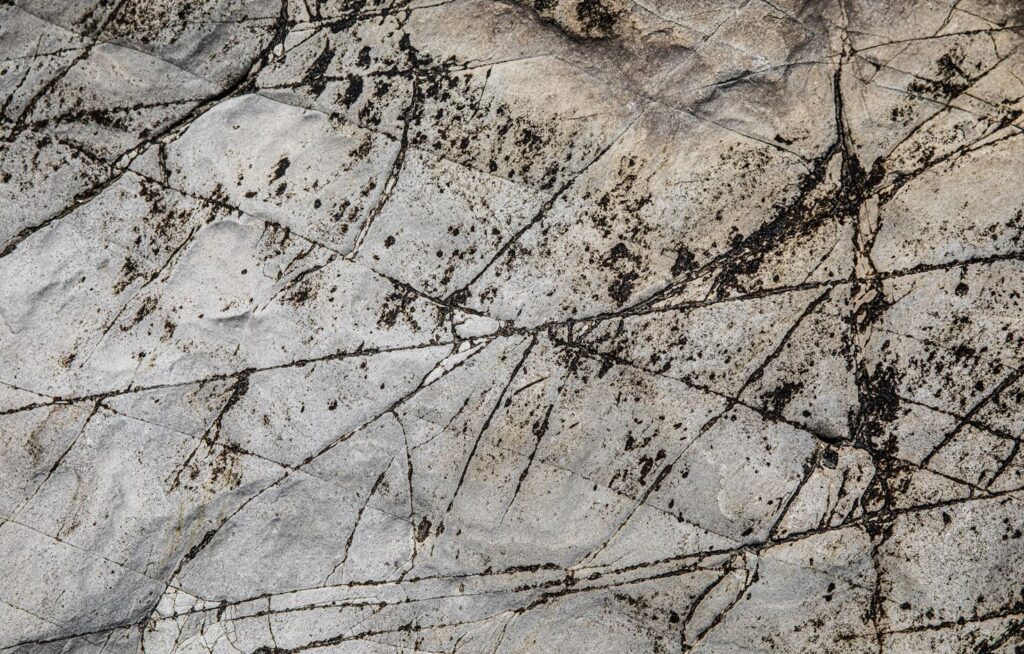There's a good reason why natural stone countertops are all the rage these days: they look beautiful and last a long time. They not only improve your kitchen's aesthetic value but also outperform most other materials in terms of durability and usefulness.
This article discusses natural stone kitchen countertop upkeep, pricing, and environmental impact.
What Varieties Of Natural Stone Are There?
Granite, Limestone, Marble, Slate, Travertine, Onyx, Quartzite, and Soapstone are some of the most often mined varieties of natural stone.
There are numerous subtypes within these overarching categories, each with its own illustrative, geographical, or fictitious name(s).
There is no standard for naming stones. Therefore, items that appear to be identical may go by different names in different markets. There is also a wide range of physical properties:
- The stone's hardness and porosity (its ability to absorb liquid)
- Durable against scratches and spills
- Dimensions of hue, feel, pattern, and veining
- Dimensions and thickness of the slabs
- Surface treatment
This variation gives each stone slab its character in a market saturated with artificial stones that all look the same.
Which Stone Is Best for Me, and How to Choose It?
Choosing a gem is a complex task. A person may be drawn to a certain type of stone due to its popularity or status, only to realise later that it is unsuitable for their needs.
As was previously noted, the physical features of stones play a significant role in determining their applicability. We recommend narrowing your stone alternatives by considering how you'll use those surfaces to decide.
Important considerations beyond your budget that can help you zero in on a stone:
- The various forms of kitchen cookery;
- How often users knock items over or lose their balance;
- How careful people are to avoid making messes;
- How careful users are with keeping things tidy;
Compiling a comprehensive list of all-natural stone varieties would be impossible according to these criteria. However, as a general rule of thumb, the most difficult stones to keep are porous ones like marble. Granites and quartzites, on the other hand, are significantly tougher and stain-resistant (when sealed), making them ideal for kitchen countertops.
If you already have your heart set on a particular stone, a good kitchen designer will still ask you these questions and make recommendations for stones that will work best. Of course, you're free to go against their advice; know you're doing so at your peril. After selecting a few potential stones, it is time to examine them in their full size.
Kitchen Countertops Made From Natural Stone: Pros and Cons
Natural stone countertops, while beautiful, come at a hefty price. Should you pay more than you have to? Let's look at this stuff's primary benefits and drawbacks.
Advantages Of Natural Stone Countertops
Charming Appearance.
There's no denying the undeniable beauty of genuine wood, stone, or other natural materials. To prepare food in such a luxury kitchen's prep space is to experience a spiritual reconnection with the earth.
Hardy Material.
Natural stone countertops, because of their resistance to heat, cold, shock, and chemicals, last for a long time. Granite, along with quartz, is the hardest natural stone.
Gray-blue, emerald, pink, and dark brown are some uncommon colours found in natural stone that are challenging to replicate in an engineered setting.
Natural Materials Have Disinfecting Properties.
It is widely believed that marble can eradicate all disease-causing bacteria and pathogens. Therefore, in terms of hygiene, marble countertops are the best alternative.
Property Value
A home with natural stone countertops is more attractive to potential buyers. They are typically seen as a selling point by prospective purchasers.
Disadvantages Of Natural Stone
Granite Is A Little Fonit.
Quartz and granite exhibit trace amounts of radioactivity, although at levels well below those considered dangerous to humans. Granite is the best granite there is. If you're considering ordering a countertop produced from this material, you should verify its quality by requesting a certificate detailing its specifications.
Damage To Marble Countertops Is Common.
Marble is the most eco-friendly material. However, it requires specific maintenance. This organic material's flaw is its porousness and high moisture absorption rate. This explains why spills are so common.
The Presence Of Seams.
Natural stone cannot be cut and polished to create a smooth countertop. Therefore, great care must be taken when setting natural stone. Only a skilled professional should mount the countertop.
Care Must Be Taken With All Natural Materials.
Stone, like all organic materials, degrades with time. Applying a protective substance to your workspace regularly is a good idea. He isn't always a helping hand, though.
Problems With Repairing.
Natural stones are far more difficult to repair than artificial ones. In certain extreme circumstances, repair isn't an option.
High Price.
The primary drawback of using natural materials for countertops is their hefty price tag. We are talking about the cost of the equipment in the office and the headset as a whole. The higher cost is due to the necessity for a more robust framework to support the substantial weight of natural stone.
The Advantages of Using Natural Stone for Your Kitchen Floors Tiles
Durability For Longevity
Regarding sustainability, there is no better option than natural stone tiles for your kitchen. These tiles can tolerate a lot of spills, foot traffic, and impacts without seeming worn out like their synthetic counterparts. Purchasing premium tiles for your kitchen walls ensures a long-lasting layout with fewer regular changes, cutting down on trash and your home's environmental impact.
Reusability and Recyclability
Natural stone kitchen tiles are also highly recyclable and reusable, which is great news for the environment. If you ever decide to change the style of your kitchen, you can relax knowing that the tiles may be reused or recycled. We're pleased to provide environmentally friendly options like taking back old tiles for recycling or helping you find new uses for them. Selecting natural stone tiles for your kitchen floor is one way you can help promote resource conservation and waste reduction to create a more sustainable economy.
Energy Efficiency
Because of their high thermal conductivity, natural stone tiles are a great choice for creating a comfortable temperature range in the kitchen. Because of the tiles' cool surface, your kitchen will stay noticeably cooler without artificial cooling during the hot summer. Stone tiles provide the same effect in colder months, helping to keep the space toasty without overusing heaters. Glasshouse gas emissions can be reduced, and a more sustainable way of living can be promoted simply by using less energy.
Low Environmental Impact
On the other hand, natural stone tiles have a smaller environmental impact over their whole life cycle than synthetic tiles. When purchased from dependable vendors such as The Stone Flooring, natural stone tiles produce almost no carbon dioxide throughout the manufacturing process. Natural stone is more eco-friendly than artificial options since less energy is used in extraction and processing, translating to less air and water pollution. You can reduce the harmful effects on ecosystems and show your support for ethical sourcing practices by using natural stone kitchen tiles.
Improved Indoor Air Quality
Keeping your home's air clean is crucial to your family's well-being. Some tiles are made with synthetic materials that may off-gas VOCs into the indoor environment, harming health. On the other hand, natural stone tiles make for a healthier kitchen because they don't off-gas hazardous chemicals or volatile organic compounds. Installing tiles made of natural stone can lessen the risk to your family's health from indoor air pollution.
Easy Maintenance And Longevity
Natural stone tiles are long-lasting and simple to clean and care for. These tiles will retain their brilliance for decades if given the appropriate maintenance and attention. Care and maintenance instructions for natural stone tiles are included in The Stone Flooring to ensure their durability. When you purchase materials that last a long time, you save money and lessen the environmental effect of making and disposing of synthetic substitutes.
FAQs About Masonry
Granite is a popular choice for kitchen countertops due to its hardness and durability. Other options include quartzite and soapstone.
Some natural stones are more porous and may require sealing to prevent staining. Regular sealing and wiping up spills promptly help maintain their appearance.
While natural stone is durable, it can chip or crack if subjected to heavy impacts. However, with proper care, this risk is minimal.
Natural stone is considered eco-friendly as it is a natural, renewable resource. However, the extraction and transportation processes can have environmental impacts, so sourcing locally and responsibly is recommended.
Yes, natural stone comes in various colours and patterns, allowing you to choose a unique look that complements your kitchen's design and style.
How to Maintain and Care for Natural Stone
Natural stone countertops in the kitchen will retain their elegance and durability with proper maintenance. Here is the procedure:
Your Stone Needs To Be Sealed To Prevent Stains.
Most types of natural stone are porous, making them vulnerable to stains from beverages, food, and more. Sealing and resealing most natural stone counters prevents discolouration.
The following is a foolproof method for determining if your counters require sealing. The most worn surfaces can be cleaned by pouring water on them and letting them sit for a few minutes before being wiped clean. A black stain from water absorption suggests stone sealing is needed.
Sealing. Should You Do It Yourself or Hire a Pro? While it is feasible to accomplish this on your own, having a professional stone care specialist do it will guarantee that the stone is properly covered and that any excess sealer that could dull or ruin the stone's beauty is removed.
Clean With Stone-Safe Products
Use only a neutral pH cleaner approved on natural stone for routine cleaning. And please, for the love of God, ignore your Aunt if she recommends cleaning your stone with vinegar and water. Scrubbing or acidic cleaners should be avoided at all costs.
Depending on the dish soap you choose, even washing your natural stone with water and soap can leave a filmy residue and even cause discolouration.
Even worse is the possibility that glass cleaner will degrade the polish over time. Be careful not to get glass cleaner on the fragile vanity tops below when cleaning the mirrors above them.
Immediately Respond to Stains
The stain quickly overflows. You should immediately treat your stone if it becomes stained.
Avoid Damage
Stones made of calcite, like the onyx on your bar and the marble on your vanities, are often damaged by spills containing acids. Use a lovely tray instead of setting down your fragrances and cosmetics on your fragile vanity top.
There's no denying that granite is strong, but normal care should still be observed. While most natural granite types are heat-resistant, you shouldn't take any chances. Put trivets underneath any frying pans you use.
Keep the room as shaded as possible. Some types of stone can be dulled or discoloured by exposure to ultraviolet (UV) light. Some stones have this more because of the fillers used on them than the stones themselves. Although preventive remedies are available, most people should be fine by avoiding direct contact.
Get Help If You Need It
Periodically, you should have your stone restoration professional clean, polish, and seal your countertops to keep them looking their best.
The beauty of natural stone is that in the hands of a skilled stone restoration contractor, it may be brought back to life after being etched, dulled, scratched, or otherwise damaged.
Conclusion
Natural stone countertops are popular due to their beauty, durability, and environmental impact. There are various types of natural stone, including granite, limestone, marble, slate, travertine, onyx, quartzite, and soapstone. These stones have varying physical properties, such as hardness, porosity, durability against scratches and spills, hue, feel, pattern, veining, and surface treatment.
Choosing the right stone is a complex task, with factors like kitchen usage, balance, cleanliness, and budget considerations playing a role. Porous stones like marble are the most difficult to maintain, while granites and quartzites are tougher and stain-resistant. A good kitchen designer can help you narrow down your options and make recommendations for the best stone.
Natural stone countertops come at a high price, but they offer several advantages. They have a charming appearance, are hard, and have disinfecting properties. However, they also have drawbacks, such as being a little finite, common damage to marble countertops, seams, and needing regular care. Natural stones are more difficult to repair than artificial ones, and their high cost is due to the need for a more robust framework.
In terms of kitchen floor tiles, natural stone tiles offer long-lasting durability, reducing waste and reducing the environmental impact of your home. Purchasing premium tiles ensures a sustainable layout with fewer frequent changes, reducing trash and reducing the environmental impact of your kitchen.
Natural stone kitchen tiles are highly recyclable and reusable, promoting resource conservation and waste reduction. They are also energy efficient, providing a comfortable temperature range without artificial cooling during hot summers and colder months. Natural stone tiles have a lower environmental impact than synthetic tiles, producing almost no carbon dioxide during the manufacturing process. They also have improved indoor air quality, as they do not off-gas hazardous chemicals or volatile organic compounds.
Natural stone countertops can be easily maintained and long-lasting, with care instructions included in The Stone Flooring to ensure durability. To maintain and care for natural stone, seal the stone to prevent stains and use neutral pH cleaners approved for natural stone. Avoid using acidic cleaners and avoid using glass cleaner on fragile vanity tops.
If a stain occurs, treat it immediately and avoid damage to calcite and granite stones. Use trivets underneath frying pans and keep the room shaded to prevent dulling or discoloration. Stone restoration professionals can help restore natural stone countertops after being etched, dulled, scratched, or otherwise damaged.
In summary, natural stone kitchen tiles offer numerous benefits, including energy efficiency, environmental sustainability, and easy maintenance. By choosing natural stone tiles, you can contribute to a more sustainable and eco-friendly kitchen.
Content Summary:
- There's a good reason why natural stone countertops are all the rage these days: they look beautiful and last a long time.
- They not only improve your kitchen's aesthetic value but also outperform most other materials in terms of durability and usefulness.
- This article discusses natural stone kitchen countertop upkeep, pricing, and environmental impact.
- Granite, Limestone, Marble, Slate, Travertine, Onyx, Quartzite, and Soapstone are some of the most often mined varieties of natural stone.
- As was previously noted, the physical features of stones play a significant role in determining their applicability.
- Granite, along with quartz, is the hardest natural stone.
- Therefore, in terms of hygiene, marble countertops are the best alternative.
- A home with natural stone countertops is more attractive to potential buyers.
- Regarding sustainability, there is no better option than natural stone tiles for your kitchen.
- Purchasing premium tiles for your kitchen walls ensures a long-lasting layout with fewer regular changes, cutting down on trash and your home's environmental impact.
- Natural stone kitchen tiles are also highly recyclable and reusable, which is great news for the environment.
- Selecting natural stone tiles for your kitchen floor is one way you can help promote resource conservation and waste reduction to create a more sustainable economy.
- Because of their high thermal conductivity, natural stone tiles are a great choice for creating a comfortable temperature range in the kitchen.
- Natural stone is more eco-friendly than artificial options since less energy is used in extraction and processing, translating to less air and water pollution.
- You can reduce the harmful effects on ecosystems and show your support for ethical sourcing practices by using natural stone kitchen tiles.
- Keeping your home's air clean is crucial to your family's well-being.
- Some tiles are made with synthetic materials that may off-gas VOCs into the indoor environment, harming health.
- Natural stone tiles are long-lasting and simple to clean and care for.
- Care and maintenance instructions for natural stone tiles are included in The Stone Flooring to ensure their durability.
- Natural stone countertops in the kitchen will retain their elegance and durability with proper maintenance.
- Sealing and resealing most natural stone counters prevents discolouration.
- The following is a foolproof method for determining if your counters require sealing.
- Sealing.
- And please, for the love of God, ignore your Aunt if she recommends cleaning your stone with vinegar and water.
- Scrubbing or acidic cleaners should be avoided at all costs.
- Depending on the dish soap you choose, even washing your natural stone with water and soap can leave a filmy residue and even cause discolouration.
- Even worse is the possibility that glass cleaner will degrade the polish over time.
- Be careful not to get glass cleaner on the fragile vanity tops below when cleaning the mirrors above them.
- You should immediately treat your stone if it becomes stained.
- Use a lovely tray instead of setting down your fragrances and cosmetics on your fragile vanity top.
- While most natural granite types are heat-resistant, you shouldn't take any chances.
- Keep the room as shaded as possible.
- Some types of stone can be dulled or discoloured by exposure to ultraviolet (UV) light.
- Periodically, you should have your stone restoration professional clean, polish, and seal your countertops to keep them looking their best.
- The beauty of natural stone is that in the hands of a skilled stone restoration contractor, it may be brought back to life after being etched, dulled, scratched, or otherwise damaged.


